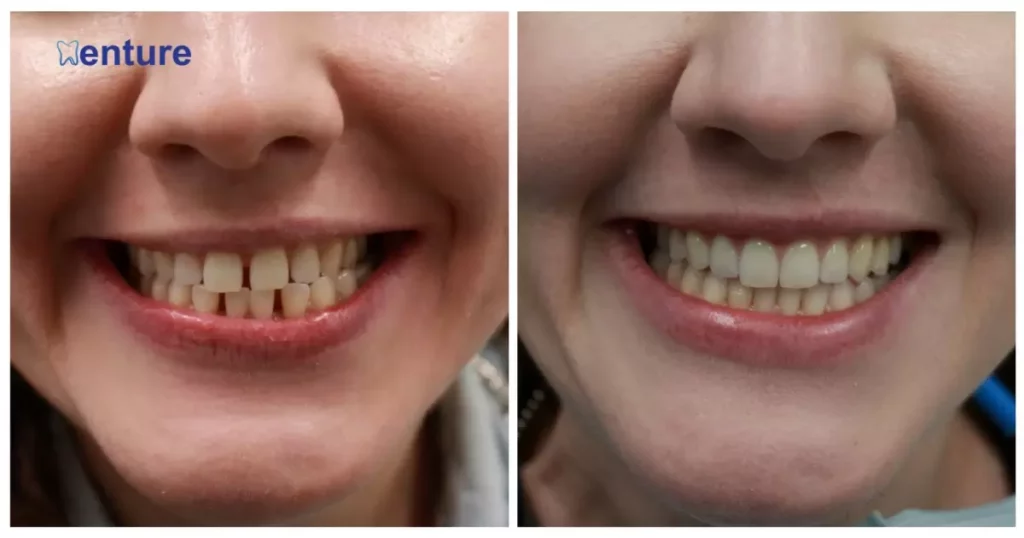Veneers and dentures are not the same. Veneers are thin shells for improving the appearance of individual teeth and hiding stains or chips. Dentures, on the other hand, are removable replacements for missing teeth used to restore a full smile.
In the world of smiles, veneers and dentures play different roles. Veneers are like a touch-up for your teeth, addressing stains and chips. On the flip side, dentures step in when teeth take a leave of absence.
Exploring the realm of smiles reveals the distinct roles of veneers and dentures. Veneers act like a makeover, perfecting teeth by addressing stains and chips. However, it’s essential to note that dentures are better than they used to be.
Understanding Veneers
Veneers are like the fashion designers of the dental world. These thin shells are custom-made to improve the appearance of your teeth, whether dealing with stubborn stains, chips, or uneven shapes. Picture them as a sleek, protective layer, giving your smile a polished and photogenic finish.
The process is surprisingly straightforward. First, a small layer of enamel is shaved off to make room for the veneer. Then, the custom-designed shell is bonded to your tooth, transforming your dental imperfections into a flawless, natural-looking set.
Application Process
When it comes to the application process for veneers, simplicity reigns. First, a consultation with your dentist kicks things off. They’ll discuss your goals and assess if veneers align with your smile dreams. If it’s a match, the next step involves painless teeth preparation, making way for the veneers to work their magic.
Now, shifting gears to dentures, the process starts with a comprehensive dental examination. Your dentist maps out a plan tailored to your unique needs. Following this, any necessary extractions pave the way for denture fitting. It’s a step-by-step journey, ensuring your new smile fits seamlessly into place, making both the veneer and denture application experiences uniquely tailored for each individual.
Deciphering Dentures
Understanding dentures is like unlocking the secrets of a brighter smile. These custom-made replacements fill the void left by missing teeth, bringing back confidence and functionality. Crafted to fit snugly, dentures make chewing, talking, and smiling feel natural once more.
There are two types: complete and partial. Complete dentures embrace the entire mouth, while partial dentures seamlessly blend with existing teeth. Both play a crucial role in restoring not just the physical aspects of a smile but also the joy that comes with it.
Distinguishing Factors Between Veneers and Dentures

They’re like a touch-up, fixing stains and chips to enhance your smile. On the flip side, dentures are the stand-ins, ready to fill the gaps left by missing teeth. They’re the removable heroes, ensuring your grin stays complete.
Dentures, also known as false teeth, aren’t about covering imperfections; they’re about replacing what’s gone. So, in this dental duo, veneers and dentures, each with its distinct role, team up to keep your smile at its best.
Veneers vs Dentures
Veneers and dentures, despite hanging out in the dental world, have different gigs. Veneers are like beauty treatments for your teeth, handling stains and chips to give you a picture-perfect smile. Dentures, on the flip side, are the cool detachable buddies that jump in when some teeth decide to take a vacation, ensuring your smile stays complete.
While veneers focus on enhancing the appearance of existing teeth, dentures step up as versatile replacements for the absent ones. They’re not two peas in a pod but rather dental companions, each bringing its own flair to the game of smiles.
The Pros And Cons
Pros: Instant glow-up for your teeth, hiding flaws like stains and chips. But, keep in mind, they’re a cosmetic fix, not a replacement for missing teeth. Cons? They can be pricey, and the process involves removing some of your natural tooth enamel.
Cons: They’re your go-to if you’re missing teeth, offering a complete smile. Plus, they’re removable for ease. On the flip side, cons include potential discomfort and adjustments, and they might need replacement over time. In the end, it’s a trade-off between a quick upgrade or a complete dental makeover.
Which One Is Better For You And Why?
Choosing between veneers and dentures boils down to your dental needs. Veneers are your go-to for enhancing the appearance of individual teeth and covering imperfections like stains or chips. On the flip side, dentures step in if you’re missing teeth, offering a comprehensive solution to restore a complete smile.
Consider the specifics: veneers for targeted improvements, and dentures for a complete dental revival. Veneers address cosmetic concerns, perfecting the aesthetics of existing teeth. Dentures, however, are the solution for those gaps, giving you a full set of teeth to keep your smile in top form.
Which One Is More Expensive?
When it comes to cost, veneers and dentures march to different beats. Veneers, being cosmetic touch-up, usually carry a higher price tag. Their aim is to enhance the appearance of existing teeth, making them an investment for a brighter smile.
On the flip side, dentures, being functional replacements, tend to be more budget-friendly. They step in to fill the gaps left by missing teeth, offering a practical solution without breaking the bank. So, in the dollars and cents game, veneers lean towards the pricier side, while dentures bring a more wallet-friendly option to the table.
Porcelain (Indirect) Veneer Costs
The cost of porcelain veneers varies from $925 to $2,500, with an average of $1500 per tooth. If you need dental contouring, the price could be higher.
Usually, the process calls for multiple visits. Your total cost may go up if many veneers need to be installed or if further visits are necessary. A wax-up X-ray, picture, and imprint of your teeth and mouth are often taken during the first appointment before porcelain veneers are applied. This allows the dentist to plan your new smile and start the customization process.
Frequently Asked Questions
Can I get veneers if I have missing teeth?
Veneers work on existing teeth. If you’re missing teeth, dentures would be a more suitable option.
Do veneers and dentures require special care?
Yes. Veneers need regular dental hygiene, while dentures should be cleaned and stored properly to maintain their longevity.
Can I eat normally with veneers and dentures?
With veneers, yes; they’re sturdy but avoid excessive force. Dentures may require some adjustment, but once settled, you can eat a variety of foods comfortably.
Conclusion
In the world of smiles, veneers and dentures play distinct roles. Veneers, the cosmetic touch-up, perfect existing teeth, albeit at a higher cost. Dentures step in as practical replacements for the absent, offering a more budget-friendly solution.
Your choice hinges on needs and budget. Veneers, the same as dentures, invest in aesthetics, catering to those craving a flawless smile, while dentures provide a cost-effective fix for missing teeth. The Smile Saga offers options, each crafted to enhance, restore, and complete your unique dental story.











